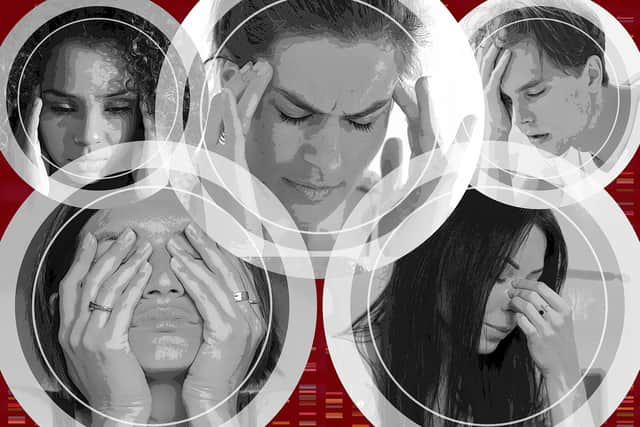Covid symptoms: warning patients at greater risk of brain fog, dementia and psychosis up to two years later
and live on Freeview channel 276
People infected with Covid face increased risk of brain fog, dementia and psychosis up to two years after infection, new research suggests.
Adults are also at heightened risk of suffering from anxiety and depression, although this subsides within two months post-infection, and over a couple of years is no more likely than any other respiratory infections.
Advertisement
Hide AdAdvertisement
Hide AdThe study of some 1.25 million people diagnosed with coronavirus found that children were more likely to be diagnosed with some conditions, like seizures and psychotic disorders, but the likelihood of most diagnoses after Covid was lower than in adults.
The Delta Covid variant was associated with more disorders than the Alpha strain, according to the research, while Omicron was linked with similar neurological and psychiatric risks as Delta.


What did researchers find?
Researchers analysed data on 14 neurological and psychiatric diagnoses gathered from electronic health records, mostly from the US, over a period of two years.
It found that in adults, the risk of having a depression or anxiety diagnosis initially increased after infection. It then returned to the same risk as other respiratory infections after a relatively short time, with depression at 43 days, anxiety at 58 days.
Advertisement
Hide AdAdvertisement
Hide AdAfter two years, there was no difference in the overall incidence of depression and anxiety between the Covid group and the other respiratory infections group.
However, the risk of diagnosis of some other neurological and mental health conditions was still higher after infection from Covid than for other respiratory infections at the end of the two-year follow-up.
Findings showed that adults aged between 18 and 64 who had Covid up to two years previously had a higher risk of brain fog and muscle disease, compared to those who had other respiratory infections up to two years previously.
The research also found that in adults aged 65 and over who had Covid up to two years previously, there was a higher occurrence of three conditions compared to those who previously had a different respiratory infection. These were:
Advertisement
Hide AdAdvertisement
Hide Ad- brain fog - 1,540 cases per 10,000 people
- dementia - 450 cases per 10,000 people
- psychotic disorder - 85 cases per 10,000 people
Professor Paul Harrison, lead author of the study, from the University of Oxford, said that while the numbers are not trivial, they are not huge and need to be set against the increasing burden of mental and brain health problems that may have occurred in the whole population because of the pandemic.
Researchers are now calling for more support and resources for healthcare providers in diagnosing and managing these conditions.
Prof Harrison said: “In addition to confirming previous findings that Covid-19 can increase the risk for some neurological and psychiatric conditions in the first six months after infection, this study suggests that some of these increased risks can last for at least two years.
“The results have important implications for patients and health services as it suggests new cases of neurological conditions linked to Covid-19 infection are likely to occur for a considerable time after the pandemic has subsided.
Advertisement
Hide AdAdvertisement
Hide Ad“Our work also highlights the need for more research to understand why this happens after Covid-19, and what can be done to prevent or treat these conditions.”
What support is there for Long Covid sufferers?
People who suffer with the effects of coronavirus for more than 12 weeks are said to have ‘Long Covid’, or ‘post-Covid-19 syndrome.
The long-lasting effects can be very wide-ranging and vary from person to person, but symptoms can include:
- extreme tiredness (fatigue)
- shortness of breath
- chest pain or tightness
- problems with memory and concentration ("brain fog")
- difficulty sleeping (insomnia)
- heart palpitations
- dizziness
- pins and needles
- joint pain
- depression and anxiety
Anyone who is suffering from persistent symptoms four or more weeks after having Covid are encouraged to seek advice from a GP.
Advertisement
Hide AdAdvertisement
Hide AdA doctor may recommend some tests to find out more about the symptoms and to rule out other factors that could be causing them. This may include a blood test, checking your blood pressure and heart rate, or a chest X-ray.
You may be given advice to help manage and monitor symptoms at home, but if the effects are having a disruptive impact on your life, it is possible you may be referred to a specialist rehabilitation service, or a service that specialises in the specific symptoms you have.
More information to support your recovery can be found on the Your COVID Recovery website.
Comment Guidelines
National World encourages reader discussion on our stories. User feedback, insights and back-and-forth exchanges add a rich layer of context to reporting. Please review our Community Guidelines before commenting.
